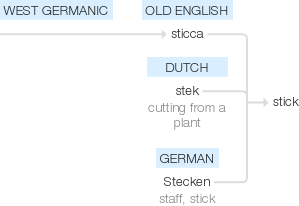Stick
Old English sticca ‘peg, stick, spoon’, of West Germanic origin; related to Dutch stek ‘cutting from a plant’ and German Stecken ‘staff, stick’.
wiktionary
From Middle English stikke(“stick, rod, twig”), from Old English sticca(“rod, twig”), from Proto-Germanic *stikkô, from Proto-Indo-European *(s)teyg-(“to pierce, prick, be sharp”). Cognate with Saterland Frisian Stikke(“stick”), West Flemish stik(“stick”).
From Middle English stiken(“to stick, pierce, stab, remain embedded, be fastened”), from Old English stician(“to pierce, stab, remain embedded, be fastened”), from Proto-Germanic *stikōną(“to pierce, prick, be sharp”) (compare also the related Proto-Germanic *stikaną, whence West Frisian stekke, Low German steken, Dutch steken, German stechen; compare also Danish stikke, Swedish sticka), from Proto-Indo-European *(s)tig-, *(s)teyg-(“to pierce, prick, be sharp”).
Cognate with the first etymology (same PIE root, different paths through Germanic and Old English), to stitch, and to etiquette, via French étiquette – see there for further discussion.
Possibly a metaphorical use of the first etymology ("twig, branch"), possibly derived from the Yiddish schtick.
etymonline
stick (n.)
Old English sticca "rod, twig, peg; spoon," from Proto-Germanic *stikkon- "pierce, prick" (source also of Old Norse stik, Middle Dutch stecke, stec, Old High German stehho, German Stecken "stick, staff"), from PIE root *steig- "to stick; pointed" (see stick (v.)).
Meaning "staff used in a game" is from 1670s (originally billiards); meaning "manual gearshift lever" is attested by 1914. Alliterative connection of sticks and stones is recorded from mid-15c.; originally "every part of a building." Stick-bug is from 1870, American English; stick-figure is from 1949.
stick (v.)
Old English stician "to pierce, stab, transfix, goad," also "to remain embedded, stay fixed, be fastened," from Proto-Germanic *stik- "pierce, prick, be sharp" (source also of Old Saxon stekan, Old Frisian steka, Dutch stecken, Old High German stehhan, German stechen "to stab, prick"), from PIE *steig- "to stick; pointed" (source also of Latin instigare "to goad," instinguere "to incite, impel;" Greek stizein "to prick, puncture," stigma "mark made by a pointed instrument;" Old Persian tigra- "sharp, pointed;" Avestan tighri- "arrow;" Lithuanian stingu, stigti "to remain in place;" Russian stegati "to quilt").
Figurative sense of "to remain permanently in mind" is attested from c. 1300. Transitive sense of "to fasten (something) in place" is attested from late 13c. To stick out "project" is recorded from 1560s. Slang stick around "remain" is from 1912; stick it as a rude item of advice is first recorded 1922. Related: Stuck; sticking. Sticking point, beyond which one refuses to go, is from 1956; sticking-place, where any thing put will stay is from 1570s. Modern use generally is an echo of Shakespeare.
